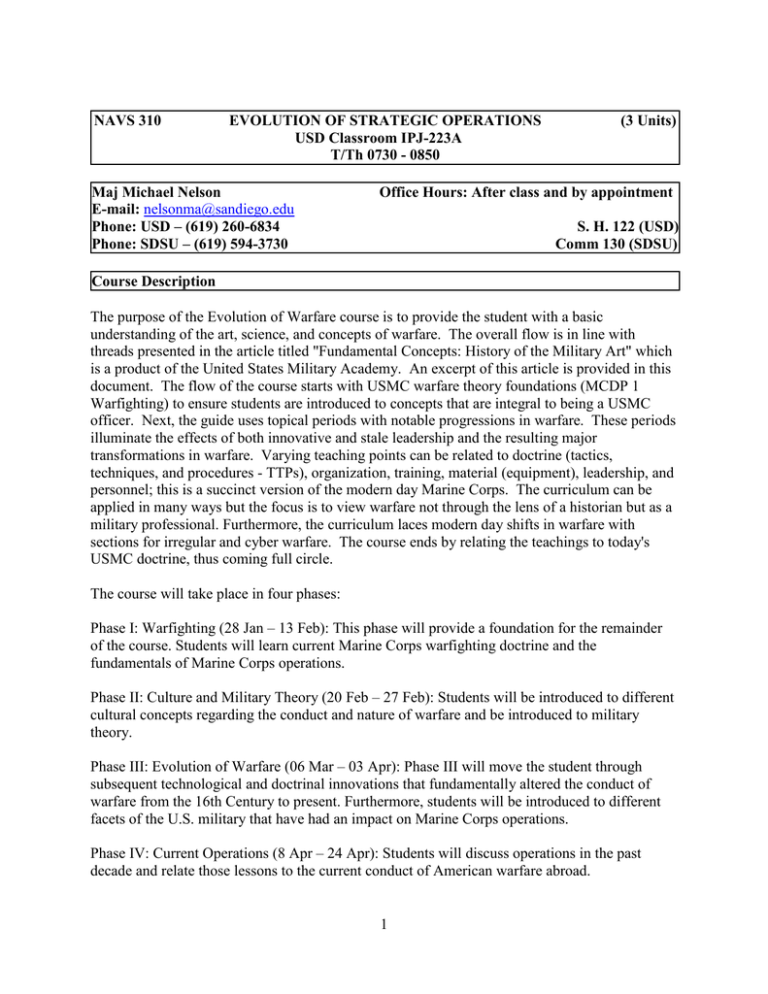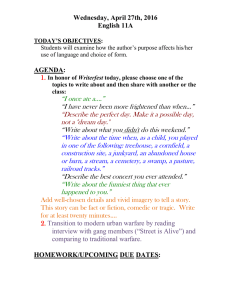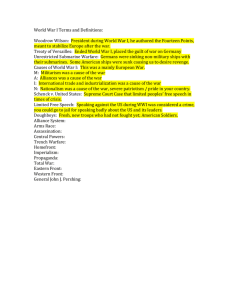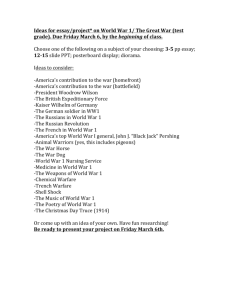NAVS 310 ... USD Classroom IPJ-223A
advertisement

NAVS 310 EVOLUTION OF STRATEGIC OPERATIONS USD Classroom IPJ-223A T/Th 0730 - 0850 Maj Michael Nelson E-mail: nelsonma@sandiego.edu Phone: USD – (619) 260-6834 Phone: SDSU – (619) 594-3730 (3 Units) Office Hours: After class and by appointment S. H. 122 (USD) Comm 130 (SDSU) Course Description The purpose of the Evolution of Warfare course is to provide the student with a basic understanding of the art, science, and concepts of warfare. The overall flow is in line with threads presented in the article titled "Fundamental Concepts: History of the Military Art" which is a product of the United States Military Academy. An excerpt of this article is provided in this document. The flow of the course starts with USMC warfare theory foundations (MCDP 1 Warfighting) to ensure students are introduced to concepts that are integral to being a USMC officer. Next, the guide uses topical periods with notable progressions in warfare. These periods illuminate the effects of both innovative and stale leadership and the resulting major transformations in warfare. Varying teaching points can be related to doctrine (tactics, techniques, and procedures - TTPs), organization, training, material (equipment), leadership, and personnel; this is a succinct version of the modern day Marine Corps. The curriculum can be applied in many ways but the focus is to view warfare not through the lens of a historian but as a military professional. Furthermore, the curriculum laces modern day shifts in warfare with sections for irregular and cyber warfare. The course ends by relating the teachings to today's USMC doctrine, thus coming full circle. The course will take place in four phases: Phase I: Warfighting (28 Jan – 13 Feb): This phase will provide a foundation for the remainder of the course. Students will learn current Marine Corps warfighting doctrine and the fundamentals of Marine Corps operations. Phase II: Culture and Military Theory (20 Feb – 27 Feb): Students will be introduced to different cultural concepts regarding the conduct and nature of warfare and be introduced to military theory. Phase III: Evolution of Warfare (06 Mar – 03 Apr): Phase III will move the student through subsequent technological and doctrinal innovations that fundamentally altered the conduct of warfare from the 16th Century to present. Furthermore, students will be introduced to different facets of the U.S. military that have had an impact on Marine Corps operations. Phase IV: Current Operations (8 Apr – 24 Apr): Students will discuss operations in the past decade and relate those lessons to the current conduct of American warfare abroad. 1 Course Objectives/Candidate Outcomes 1. To introduce the student to a warfighting culture. 2. Comprehend baseline Marine Corps doctrine. 3. To develop the student’s critical thinking skills as they pertain to warfare. 4. Comprehend the major cultural, technological, and doctrinal transformations in warfare. 5. To develop the fundamental naval officer skills of writing, analytic thinking, professional writing, and public speaking. 6. To impart to the student the lessons learned with the development of warfare with an emphasis on leadership remaining forward thinking and not stagnate. 7. To give the student a baseline of understanding of today's conventional and irregular warfare and the historical context as to how warfare has evolved throughout history. 8. Comprehend the importance of leaders remaining vigilant with development of warfare as it is related to doctrine, training, organization, material (equipment), and leadership. Textbook Readings War Made New, Max Boot (WMN) MCDP-1, Warfighting (WAR) Supplemental readings posted on Blackboard, as directed by the instructor Course Requirements/Activities 1. Reading Assignments: Students are to read all assigned material prior to each class session. Proper preparation will be reflected in performance on quizzes, exams, and class discussion/participation. 2. Quizzes/Discussion Questions: Students must be prepared to participate in each class by completing assigned reading and assignments. Each class begins by either turning in answers to discussion questions or completing a quiz. 3. Group Presentation: All students will participate in a group presentation. Working as a team and learning to capitalize on each other’s strength is the foundation for teamwork. Students will be assigned groups and provide a 20 minute presentation on the assigned topic. Students are encouraged to utilize multiple multimedia methods (Power Point, Sand Table, and White Board) but are required to provide the instructor with a printed outline or copy of the power point, one 2 week prior to their presentation. Students will be graded based on content, presentation quality, and knowledge of the topic. Students will cite sources utilized in the presentation. 4. Term Paper: Each presentation group will complete a term paper on the topic assigned for their presentation. a. The paper will be 750 – 1000 words. The paper will include a Cover Sheet, Abstract, and Bibliography with at least three credible sources. These items are not included in the total 750 – 1000 word count. b. Groups will be evaluated on their ability to insightfully apply course concepts to your selected real-world issue. This is an opportunity for students to identify, investigate and prepare themselves for challenging issues that await them upon commissioning. (1) Papers will be submitted using Times New Roman, 12 font. Use MLA Style including parenthetical reference citations and works cited page. See the MLA Handbook for Writers of Research Papers. (2) Note: You must to take your term paper to your university writing center and attach the assessment report to the marked-up draft copy upon submission. This does not relieve you of the responsibility to proofread and make corrections to your paper. 5. Exams: A midterm and final exam will be given. These exams will focus more on the students understanding of theories and concepts rather than memorization of facts and details. Of course, the student will have to support their understanding of the theories and concepts using specifics, examples and details learned throughout the course. Exam formats will be discussed in class. 6. Preparation and Participation: Students will be graded on a 1 to 5 point scale each class period regarding their preparation and participation in the class discussion. Furthermore, students will be evaluated on their ability to interact during student presentations, lectures, and other classroom activities. Because of the compact format of this course, it is important that students are prepared and participate in all class sessions. When you are unprepared for class sessions, you miss the opportunity to practice skills and receive feedback necessary for your own selfdevelopment. When you are unprepared, you also deprive your classmates of your feedback on their comments, which diminishes their learning potential. Assessment Plan/Grading Criteria/Rubric Grading Scale: 93% - 100% = A 90% - 92.9% = A87% - 89.9% = B+ 83% - 86.9% = B 80%-82.9% 77%-79.9% 73%-76.9% 70%-72.9% = B= C+ =C = C- 3 60%-69.9% = D 0% - 59.9% = F Grading Criteria: Quizzes and Assignments Group Presentation Term Paper Midterm Exam Final Exam Class Participation Total 100 pts 50 pts 50 pts 100 pts 100 pts 100 pts 500 pts 20% 10% 10% 20% 20% 20% 100% Course Outline The class schedule is provided below as a guide for the topics and timeframes in which we will cover them. Class Session – Date Lesson 1 – 28 Jan Lesson Introductions and Syllabus Lesson Lesson Lesson Lesson The Nature of War The Theory of War Preparing for War Conduct of War 2 3 4 5 – – – – 30 Jan 4 Feb 6 Feb 11 Feb Lesson 6 – 13 Feb 18 Feb WAR Chapter 1, BB: Immutable Nature of War WAR Chapter 2 WAR Chapter 3 WAR Chapter 4, BB: Attritionist Letter MCDP 1-0 pp. 1-2 to 1-10, 2-2 to 2-3, 310 to 3-16, 4-21 to 4-22, 6-2, 6-11 to 613, 6-24, 7-7 to 7-23, 8-3 to 8-8 App A and B Basics of Marine Corps Operations Lesson 7 – 20 Feb Admin Day – NO CLASS Western and Easter Way of War Lesson 8 – 25 Feb Non-State Actors Lesson 9 – 27 Feb 4 Mar Lesson 10 – 6 Mar 11 Mar 13 Mar Lesson 11 – 18 Mar Lesson 12 – 20 Mar Introduction to Military Historical Analysis and Theories MIDTERM EXAM Gunpowder Revolution SPRING BREAK – NO CLASS SPRING BREAK – NO CLASS 1st Industrial Revolution 2nd Industrial Revolution Lesson 13 – 25 Mar Lesson 14 – 27 Mar Lesson 15 – 1 Apr Lesson 16 – 3 Apr Lesson 17 – 8 Apr Lesson 18 – 10 Apr Assigned Reading Indirect Fire Evolution of Airpower U.S. Navy and Sea Power Today Reconnaissance 4th Generation Warfare Counterinsurgency: The Russian Experience BB: Clausewitz and His Works; Sun Tzu; Watch: Art of War, Chpt 1 BB: Good Anthropology, Bad History: The Cultural Turn in Studying War WMN pp. 7-11 and 13-16, BB: The Changing Face of War: Into 4th Gen Warfare, The Problem with 4th Gen Warfare, WMN pp. 1-6, 19-25 & 50-76 WMN pp. 109-145 WMN pp. 205-240 WMN pp. 84-85, 103, 129-130, 143, 296297, BB: Evolution of Artillery BB: MCWP 3-2, pp. 1-2 to 2-6 BB: US Navy in Distress BB: Scouts Out, pp. 1-5 (intro), 145-177 and 197-205 (conclusions) BB: Fourth Generation Warfare Primer BB: Russia in Afghanistan and Chechnya 4 Lesson 19 – 15 Apr 17 Apr Lesson 20 – 22 Apr Lesson 21 – 24 Apr 29 Apr Lesson 22 – 1 May Lesson 23 – 6 May Lesson 24 – 8 May Lesson 25 – 13 May Information Operations EASTER BREAK – NO CLASS Counter Insurgency: Operation Iraqi Freedom Operation Enduring Freedom FINAL EXAM Student Presentations Student Presentations Student Presentations Student Presentations BB: MCDP 1-0 4-22 to 4-23, JP 3-13 Info Ops, ix-xvi (executive summary) BB: “Twenty-eight Articles” TERM PAPER DUE PLNU/SDSU Students SDSU/CSUSM Students SDSU/CSUSM Students USD/UCSD Students Requests for Accommodation Reasonable accommodations in accordance with the Americans with Disabilities Act will be made for course participants with disabilities who require specific instructional and testing modifications. Students with such requirements must identify themselves to the San Diego State University Student Disability Services (619) 594-6473 (USD Students should contact University of San Diego Disability Services Office (619) 260-4655) before the beginning of the course. Every effort will be made to accommodate students’ needs, however, performance standards for the course will not be modified in considering specific accommodations. Appendices to NAVS 310 Class Leader: One student will be selected as the class leader to ensure the room and audiovisual equipment are ready for instruction. He or she will also take roll and document those arriving late. Attendance: Attendance is MANDATORY. Tardiness will not be tolerated. On the second tardy, your final grade will be reduced by 2% (10 pts). Each subsequent tardy will reduce your grade by an additional 2% (10 pts). Two or more unauthorized absences will result in a failing grade. Permission for absence must be requested in advance (via phone/email to the Instructor). Excused absence will be granted at the sole discretion of the instructor. Responsibility: Students are expected to perform at a substantially higher level of maturity and responsibility than that of most other students. In general, it is the student’s responsibility to initiate action to resolve all personal issues and ensure that administrative matters are handled in a timely manner. Students shall attend all classes and submit assignments on the due dates. Late assignments will incur a 10% grade deduction per day late. You will turn in all work, regardless if it is late or not. Should an emergency develop that warrants relief from this stated attendance and performance policy, prior approval must be obtained directly from the instructor. Unless otherwise arranged, assignments falling due on the day of an excused absence remain due on or before that day. 5 Military Protocol: Since this is a course primarily designed for and required for NROTC students, Naval protocol is emphasized and is a teaching point. As a matter of courtesy and custom, the first individual to recognize entry into the classroom by the Instructor or by the Commanding Officer of the NROTC Unit will call for “Attention on Deck.” Non-NROTC students are also asked as a matter of courtesy to follow this custom. NROTC students must adhere to the NROTC and Navy regulations for dress (no open toed shoes for men) and grooming (e.g., men are to be clean shaven, and men and women are to maintain haircuts within standards) in and out of uniform. Academic Dishonesty: Honesty and moral integrity are fundamental to the character of a Navy and Marine Corps Officer. The Midshipman Honor Code states “A midshipman will not lie, cheat, or steal.” This applies to all students in this course. Students must work alone to complete all homework, quizzes, assignments and exams. Substantiated charges will result in a failing grade and possible disenrollment from the NROTC Program with an unfavorable recommendation regarding commissioned service. The student will also be referred to the appropriate University officials for disciplinary proceedings. Grade of Incomplete: The grade of Incomplete (“I”) may be recorded to indicate (1) that the requirements of a course have been substantially completed but, for a legitimate reason, a small fraction of the work remains to be completed, and (2) that the record of the student in the course justifies the expectation that he or she will complete the work and obtain the passing grade by the deadline. It is the student’s responsibility to explain to the instructor the reasons for noncompletion of work and to request an incomplete grade prior to the posting of final grades. Students who receive a grade of incomplete must submit all missing work no later than end of tenth week of the next regular semester, otherwise the “I” grade will become a permanent “F.” Changes: I have made every attempt to make this syllabus an accurate reflection of how I intend to teach this course over the semester. However, this syllabus should not be construed as a legal contract and it may be subject to change over the semester, particularly with respect to the schedule. I reserve the right to make modifications as necessary. I will discuss any proposed or effected changes to the syllabus in class. Updated versions of the syllabus will also be posted to Blackboard--they will not be distributed in class. 6



